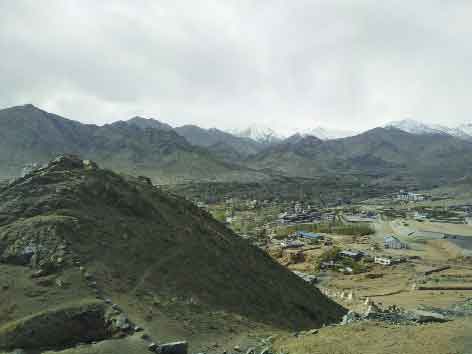Air pollution is not just a topic for school essays but has become one of the deadliest issues in the country. Stanzin Yangzom highlights the importance of afforestation
Historian Thomas Fuller once said, “One that would have fruits must climb the tree.” When one mentions Leh, the picture that comes to mind is a place with the rugged terrain of the Himalayas and sparse vegetation.
On October 29, 2012, the people of Leh witnessed an event where an attempt, though a small one, was made to turn the perception around. Volunteers planted nearly one lakh Ladakhi willow trees which was a world record. Those saplings have now grown into trees and are located between the Hemis monastery (Ladakh’s largest monastery) and the Indus River. In 2017 at a tree plantation drive organised by the Leh Forest Department, hill council chief executive councillor, Dr Sonam Dawa said, “the hill council has a road map to save the environment by planting more trees on barren land and which also stresses upon the need for water conservation.”
Environmental degradation has now become a serious issue for Ladakh and there is a need for more tree plantation which should be done on a regular basis. Different types of trees like apple, apricot, poplar, willow and walnut can easily be grown because the climatic conditions are suitable. Trees are useful for oxygen and can control air pollution. The fruits are nutritious for human beings and the leaves can be used as fodder for the animals.
Thubstant Dolma from Phey village says, “We have different types of apple trees. Due to the weather conditions, the apple harvest is good in our village. Since the last few years we have started growing different types of vegetables also. We are also trying hard to grow more trees and vegetables in the village.”
Stanzin Angmo from Nimoo village says, “We can grow poplar trees too which are useful for wood and other raw materials that are used for manufacturing disparate goods such as furniture, doors, windows and decorative items. The trees prevent soil erosion. We have been planting them near our houses for many years now.”
Tsewang Norboo from Stakna village suggests that we can plant trees in all the vacant places wherever one lives. “Trees save us from flood and many other natural calamities. Trees are already very less in number and if we continuously cut them, it can be very harmful for both human beings as well as for animals.”
Other villages have planted apricot trees which have the dual benefit of providing fruit and improving the air quality.
Ysetan Dolma from Ang village says, “Our village has lots of apricot trees. We need to plant different kinds of them. We have planted great number of poplar saplings also for future use. Both these trees help us in so many ways with our livelihood. We are able to sustain our lives from the sale of apricots and in future too we will continue to get an income from them. There are not just environmental benefits but also numerous economic benefits.”
Trees absorb harmful gases providing us with fresher and cleaner air to breathe. Air pollution is not just an essay topic for a 2nd grader anymore but one of the deadliest killers in India today. These days even a city like Leh has been facing air pollution due to shortage of trees.
These days planting trees is becoming essential because human beings are cutting them indiscriminately them for their personal greed. Rapid industrialisation, urbanisation and population growth have contributed to this denudation to a great extent. Afforestation is good for larger benefit of society. In Leh district, the quantity of trees is very less, but we can easily increase the number. The more trees we plant, the better for us, we will be able to have a clean and green environment. It helps majorly in sustaining the livelihoods of many people in Leh.
Small business opportunities in green waste management and landscaping arise when cities value mulching and its water-saving qualities. Vocational training for youth interested in green jobs has also facilitated employment. This will also help in uplifting the poor by helping them to get a better income.


























